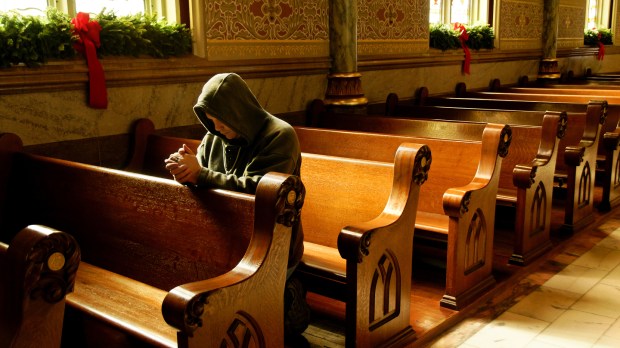The following are excerpts from the Christmas message from Cardinal Mauro Piacenza, president of Aid to the Church in Need (ACN).
The pandemic afflicting the entire world will prevent us from meeting in person this year, in that Christmas atmosphere that is always so warm and dear, and so we must resign ourselves to meeting through the electronic media. Nonetheless, our sentiments remain the same, as does the mutual prayer in which we express our reciprocal greetings.At Christmas Jesus repeats in his own person, from his cradle, to all Christians and to all men, these solemn words: “Be still, and know that I am God!” In St. John’s Gospel, we often hear Jesus using the “I Am” of God. An affirmation that is so solemn, so monumental: “I Am”. He has every right to do so. He is the Son, He alone! While we are sons and daughters, in the Son.
These are not the words of one who begs, who seeks our belief and recognition, like the many pseudo-prophets and founders of false and foolish religions who abound in the world today. They are words of authority: “Know that I am God!” He doesn’t say, believe me, please, listen to me; instead, He says: “Know!” Whether you want to hear it or not, to believe it or not, I Am God!
So let us be the first then, on our knees, to welcome this commanding Word that is spoken at Christmas, corroborated by the bi-millennial faith of the Church. Let us embrace this truth which the Council of Nicaea placed on the lampstand of the Symbol of the Faith forever, the truth by which all Christianity stands or falls. Let us embrace it as the Bible teaches us to and, following the example given us by the Blessed Virgin Mary, let us do so in silence, in silent adoration.
Let us “be still” and, if possible, take, as it were, a “holiday,” even if it be only for an hour or so, from all the material things at Christmas, so as to be able to savor this truth in all its depth. God has divested himself of his sovereign majesty, He is no longer to be feared, as He was at times in the Old Testament. He no longer wishes to strike fear into us, for now He is Immanuel, God-with-us.
But for those who are able to discern it, there is a new attribute in this, his definitive theophany, something that should fill us with amazement and leave us speechless, more than all the peals of thunder, lightning flashes and rising smoke of Sinai. And that is humility, I am speaking of humility, which is the great Christmas canticle.
To be sure, if we were to apply this virtue of humility every day in our relationships with others, we would always have peace in our hearts, in our families, in society, in the workplace, in politics, everywhere – because HUMILITAS OMNIA RESOLVITE, to quote the motto of Saint Charles Borromeo, whose icon I have right behind me, because he was a major penitentiary. Humilitas omnia resolvite. Humility resolves all things.
On the other hand, the Child Jesus came to resolve all the tangled problems of mankind, both in our personal lives and in the life of society. “See, brothers, the humility of God!”, exclaimed Saint Francis in a letter, and in the town of Greccio he dissolved into tears of joy before the manger which he had built with such love and devoted pastoral creativity, that Nativity scene that we do well to recreate in all our churches, our homes, workplaces, wherever we are not prevented from doing so by the intolerance of ‘tolerance.’
We truly celebrate Christmas if we are capable of doing today, at a distance of millennia, what we would have done had we been present there, on that blessed day, if we do what Mary taught us to do—kneel in silent adoration!
With these thoughts I send my warmest wishes to all and an affectionate remembrance in my prayers for each one of you.
This article was first published by Aid to the Church in Need and is republished here with kind permission. To learn more about ACN’s mission to help the suffering Church visit www.churchinneed.org

